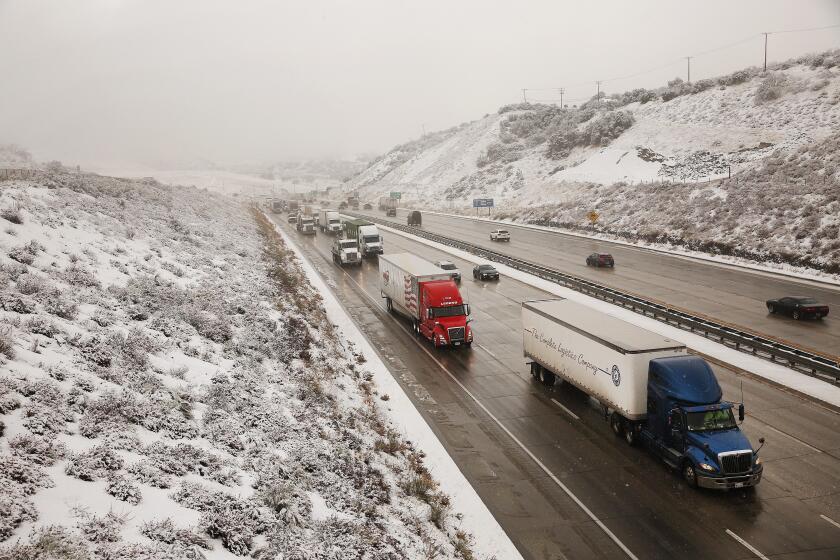Victims’ Chances of Winning Big Money Are Slim
The injured passengers from Wednesday’s deadly Metrolink crash and the families of the dead may have a difficult time winning money from the transit agency because the deaths were largely caused by Juan Manuel Alvarez, who now faces murder charges, according to legal experts.
The passengers “have a tough road ahead,” said Larry R. Feldman, a Century City attorney who represents 10 passengers injured in April 2002 when a Burlington Northern Santa Fe freight train collided with a Metrolink train in Orange County.
In order to win a lawsuit, “you have to show fault,” Feldman said. Lawyers for Metrolink can be expected to argue that in this case, the crash was the fault of Alvarez, who parked his Jeep Grand Cherokee on the tracks.
Alvarez, 25, has a history of drug charges and emotional problems and is not likely to have assets that could be used to compensate the scores of people who were hurt.
In cases in which the prime defendant has no money, plaintiffs’ lawyers typically try to find another defendant who might be required to compensate the injured. To do so in this case, they would seek evidence of some misconduct by the railroad or its employees -- a failure to install adequate warning devices or monitor the tracks for possible hazards, for example.
Some lawyers suggested that Metrolink should try to forestall that effort by offering to compensate families before any suits are filed. Steve Lantz, a spokesman for the agency, said no decision has been made about its legal stance.
But New Orleans attorney Leonard Davis, who has litigated several major cases on behalf of people injured in train crashes, said he expected that Metrolink “will try to absolve themselves of any responsibility.... They will say the driver was trespassing on their tracks and that the crash was caused by the trespass and leaving the car on the tracks.”
The law requires railroads and other companies that provide transportation to the public to exercise a great deal of care. Still, that legal duty is limited by what is considered “reasonable,” said Peter Ezzell, a Santa Monica attorney who has defended railroad companies in crash cases.
“Unless there was a history of people trying to do” what Alvarez did, Metrolink “is probably in pretty good shape,” Ezzell said. While there clearly has been a history of people getting onto train tracks by “driving around barriers attempting to beat a train,” Ezzell said, “I have never heard of one like this.”
But the transit agency is not completely out of legal danger. Under California law, even if nearly all the fault lies with Alvarez, Metrolink could be required to pay those who were injured as long as a jury decides that the agency was at least partly at fault, legal experts said.
And one clear advantage plaintiffs will have is that the people injured on the train and family members of the deceased would have jurors’ sympathy if a case were to go to trial, several lawyers said.
USC law professor Scott Bice said cases such as this are “highly dependent” on the specific facts. In this case, the outcome could turn on facts that are still being investigated: How fast was the inbound train going? How good was the visibility? How long was Alvarez’s SUV on the tracks before the inbound train hit it? Did the train have the best possible braking system? Could the train operator have used an emergency brake to minimize the impact of the crash? Could the damage have been reduced if the locomotive had been pulling the train from the front rather than pushing from the rear? How crashworthy were the train cars? Was there a history of accidents or other problems at the scene?
Moreover, Bice said the temper of the times may have an effect on the outcome. The crash comes at a time when “we are very much concerned about terrorist attacks,” which includes concern about safety on planes, trains and buses, Bice said. If a case went to trial, those concerns might weigh on the minds of jurors and affect their verdict, he said.
In addition to Metrolink, the state’s Victims Compensation Board may be a source of money for at least some of the injured because they are considered crime victims, said Fran Clader, a spokeswoman for the board.
“We are the payer of last resort,” Clader said. “This is for folks with no medical insurance,” or any other source of funds for expenses stemming from the crash.
The board can reimburse needy victims for expenses such as funeral costs, medical costs, mental health counseling, job retraining and, if need be, vehicle modification. Victims from Los Angeles County who are interested in the program should call (800) 380-3811, and victims from Ventura County should call (805) 654-3622, she said. Victims from other counties should call (800) 777-9929.
Anticipating a wave of litigation stemming from Wednesday’s crash, five investigators from the State Bar of California went to the scene of the accident and to the various hospitals where the injured were taken to watch for lawyers or their agents who might be trying to exploit the injured. Under state bar rules, lawyers are prohibited from soliciting potential clients at the scene of an accident or a hospital or employing so-called cappers to get business.
Investigator Tom Layton, a former Los Angeles County sheriff’s deputy, said he arrived at the crash site about 6:40 a.m. and spent the next four or five hours looking for suspicious persons.
“I saw a few,” he said, “but there was too much law enforcement at the scene, and they couldn’t get to where the survivors were being triaged.”
*
Times staff writers Vernon Loeb and David Rosenzweig contributed to this report.
More to Read
Sign up for Essential California
The most important California stories and recommendations in your inbox every morning.
You may occasionally receive promotional content from the Los Angeles Times.










